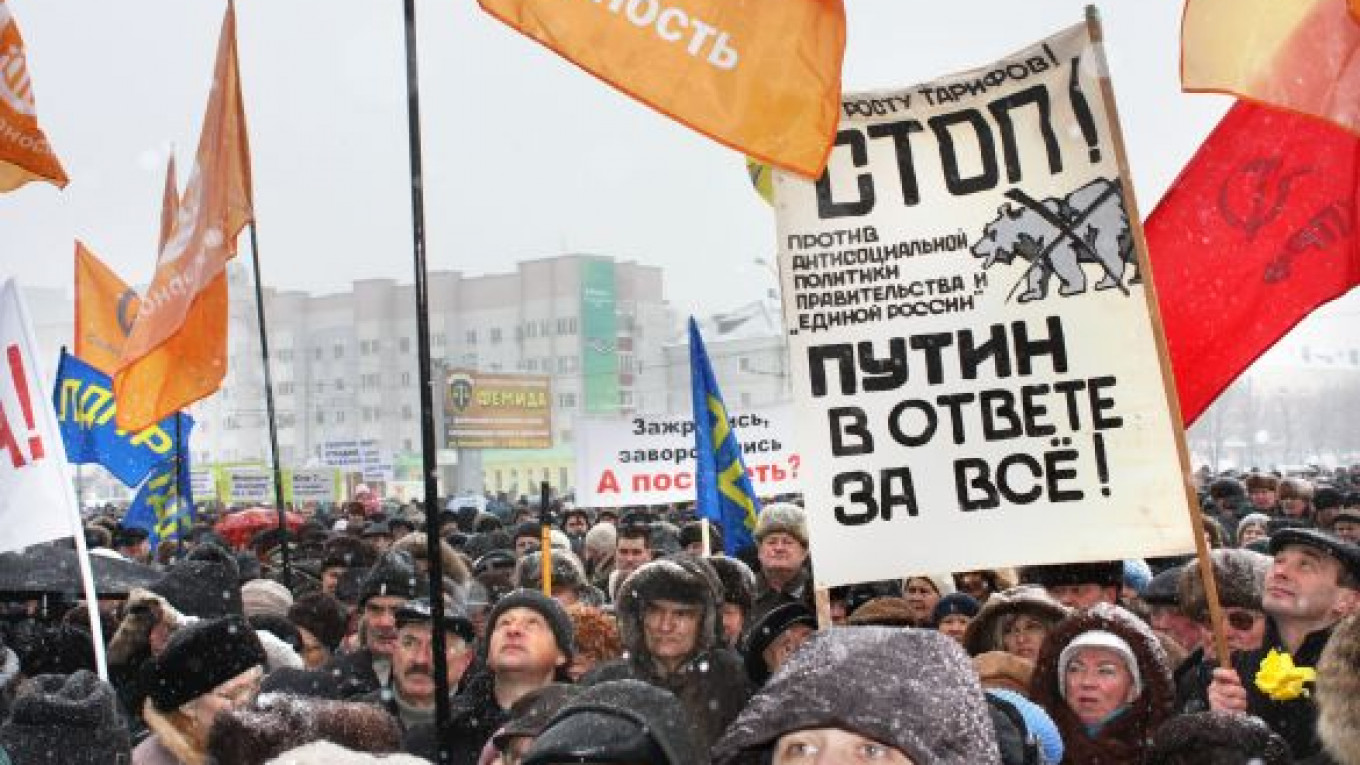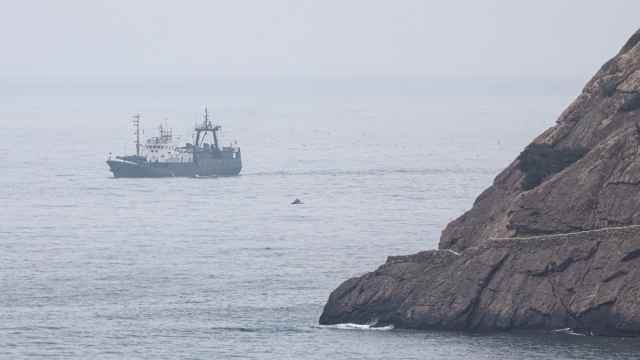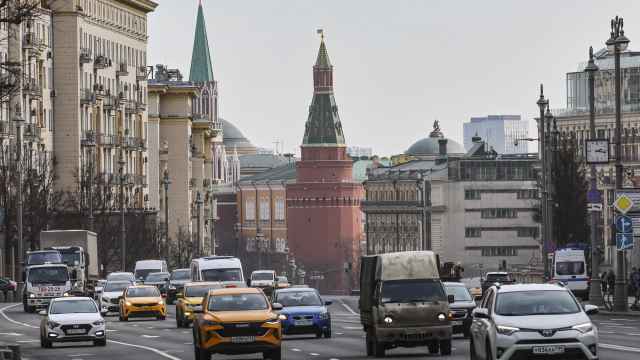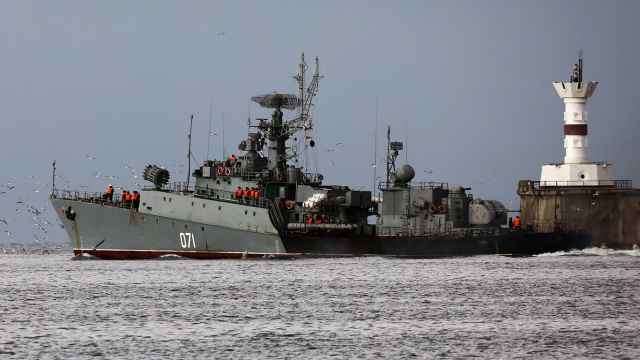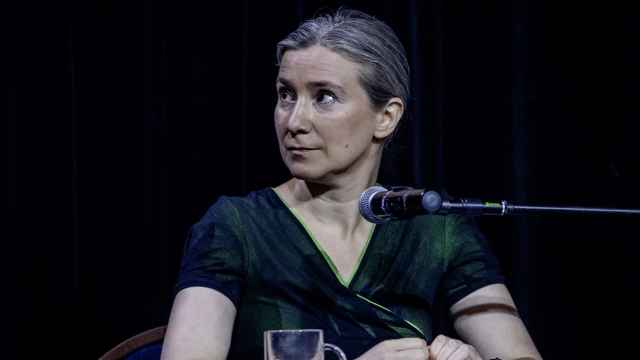Up to 12,000 protesters called on Prime Minister Vladimir Putin to resign in a rare outpouring of anger with the popular leader during a weekend rally in Kaliningrad.
The peaceful protest was the largest in a flurry of weekend demonstrations, all of which shared a common thread: growing frustration with the country’s leaders.
Police detained more than 100 protesters Sunday evening at an unsanctioned Moscow rally of 300 people organized by human rights groups.
Opposition leaders trumpeted the rallies as a sign that ordinary Russians are increasingly disenchanted with Putin’s leadership and predicted further protests.
But analysts said many people see little connection between Putin and their grievances, despite the weekend protests. As with previous, smaller outbursts of public anger, the weekend protests were ignored by all the national television channels, which are state-owned.
A leader with the opposition Solidarity group, Ilya Yashin, who attended the Kaliningrad rally, said he had not seen such a large, anti-government demonstration since 2001, when hundreds of people rallied in Moscow against the takeover of the last private national television channel, NTV, by state-owned Gazprom.
The Kaliningrad crowd, huddled in thick coats in swirling snow, carried posters reading “Putin is Responsible for Boos” and “Give Back Gubernatorial Elections.” Georgy Boos is the governor of Kaliningrad.
A video posted on YouTube shows opposition leader Boris Nemtsov delivering an impassioned speech to cheers of “We’ve had enough!”
“The rally held in Kaliningrad might really be a sign of a change in the country,” Yashin told The Moscow Times on Sunday.
He stressed that the event was anti-Putin but had still managed to unite a large crowd with various political allegiances.
In addition to Solidarity, the rally included activists with the Communist Party, the Liberal Democratic Party, Yabloko, the Patriots of Russia party, the banned National Bolshevik Party, motorists’ groups and several minor opposition movements, Solidarity said on its web site.
Hundreds of police officers kept watch at Saturday’s gathering but did not intervene.
About 12,000 people participated, Solidarity said. Police put the figure at 7,000.
The demonstration was initially called to protest a plan by the regional administration to increase the transportation tax. The regional legislature later cancelled the bill, but the rally went ahead anyway and focused instead on rising utility bills and unemployment.
United Russia, the ruling party headed by Putin, criticized the rally as “political” and “cynical.”
“Representatives of the opposition are trying to draw people to the streets to act in their own interests,” senior party official Andrei Vorobyov said in a statement released on the party’s web site. “Such a cynical position arouses feelings of indignation.”
The statement suggested that a rally over the transportation tax would easily find support from the 350,000 car owners in Kaliningrad’s 1 million population.
The last opposition rally staged in the city attracted 5,000 people on Dec. 12.
Yashin said, however, that the protesters were united over their anger with Putin, not over a popular issue like the transportation tax. He noted that the rally occurred in the “most European city,” close to the Polish city of Gdansk, the birthplace of the Polish Solidarity trade movement led by activist Lech Walesa in the 1980s.
Dmitry Oreshkin, an independent political analyst, said the size of the protest was not surprising given Kaliningrad’s close proximity to the rest of Europe but it would take time for other cities to follow suit.
“Kaliningrad is surrounded by the European Union, and the residents can compare,” Oreshkin said.
A similar but much smaller opposition rally took place in St. Petersburg on Saturday.
In Moscow, 300 people tried to stage a protest late Sunday on Triumfalnaya Ploshchad near the Mayakovskaya metro station, but police quickly dispersed the protest and detained more than 100 people, including Nemtsov and Yashin, Other Russia leader Eduard Limonov, veteran human rights activist Lev Ponomaryov and Oleg Orlov, head of the Memorial human rights group, Interfax reported.
Police broke up a similar rally in St. Petersburg late Sunday, detaining 25 of the 200 protesters, Interfax reported.
Human rights activists have been trying since May to hold a rally in central Moscow on the 31st of every month to defend their right to protest as guaranteed by the 31st provision of the Constitution.
The previous attempt to protest, on New Year’s Eve, was roughly broken up by the police, and two dozen people were detained, including Lyudmila Alexeyeva, the 82-year-old head of the Moscow Helsinki Group.
Alexeyeva was not detained Sunday night.
At least two other rallies were held in Moscow on Sunday. About 70 people gathered near the Chistiye Prudy metro station to call for Mayor Yury Luzhkov’s resignation over his decision to raze luxury houses that he says were built illegally in the Rechnik neighborhood in western Moscow. More protesters gathered on Bolotnaya Ploshchad to decry new Putin-backed trade legislation.
In Vladivostok, about two dozen people with the regional TIGR movement and the Communist Party rallied for freedom of speech and right of assembly, Interfax reported. They held posters reading “Russia Without Putin!” and “Russia Without Medvedev!” with portraits of the two leaders crossed out.
Putin and Medvedev have faced other regional protests in recent weeks, including a series of demonstrations in the Krasnodar region over what local residents say are Kremlin plans to build a luxury vacation residence in the middle of a Black Sea coastline park that is to become a federally protected nature reserve.
The first calls for Putin to resign surfaced last winter after the economic crisis first hit the country, but they have never resulted in such a large gathering as in Kaliningrad.
But Putin’s popularity remains high. A poll by state-run VTsIOM in January put his trust rating at 54 percent, the highest among politicians. President Dmitry Medvedev received 42 percent.
A Message from The Moscow Times:
Dear readers,
We are facing unprecedented challenges. Russia's Prosecutor General's Office has designated The Moscow Times as an "undesirable" organization, criminalizing our work and putting our staff at risk of prosecution. This follows our earlier unjust labeling as a "foreign agent."
These actions are direct attempts to silence independent journalism in Russia. The authorities claim our work "discredits the decisions of the Russian leadership." We see things differently: we strive to provide accurate, unbiased reporting on Russia.
We, the journalists of The Moscow Times, refuse to be silenced. But to continue our work, we need your help.
Your support, no matter how small, makes a world of difference. If you can, please support us monthly starting from just $2. It's quick to set up, and every contribution makes a significant impact.
By supporting The Moscow Times, you're defending open, independent journalism in the face of repression. Thank you for standing with us.
Remind me later.


